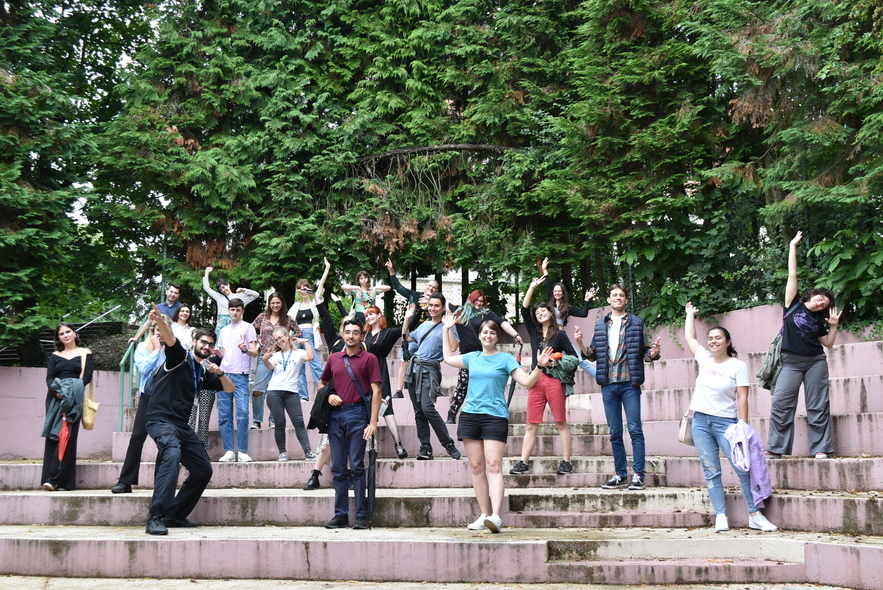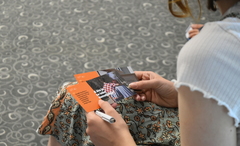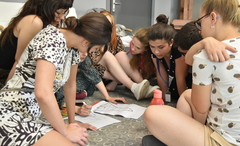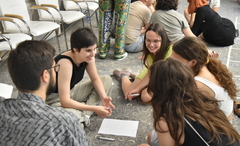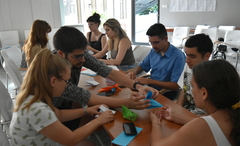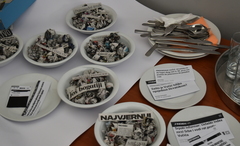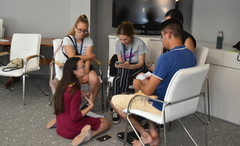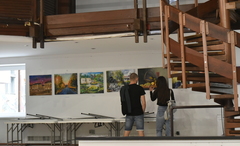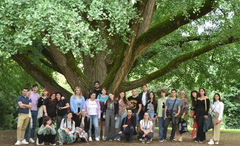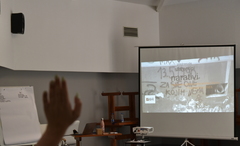Zagreb, July 19, 2023.
On July 2, 2023, in the late afternoon, 25 young people from various regions of Croatia and Serbia arrived in Daruvarske Toplice to take part in the summer school that we co-organized with the Youth Initiative for Human Rights - Serbia. This school was designed for activists between the ages of 18 and 30 as well as those who are just beginning their activism.
The participants had the chance to learn about the promotion and protection of human rights, specifically the rights of national minorities, through five thematic working days. They also had the chance to learn how to distinguish between terms like nationalism and patriotism and how the two affect the realization of both individual and collective human rights in the past and, consequently, today. Other lessons helped them become more aware of the pervasive prejudices and stereotypes toward others and those who are different.
The program consisted of lectures, workshops, visits by representatives of local communities (minority and youth) from the city of Daruvar involved in the creation of political, cultural and social content in the city, as well as work in smaller groups in which they developed their own creative content during school, and finally, a special block in which the participants themselves shared with others their professional knowledge, ways of their own activism in the communities they come from, as well as their hobbies (The ‘Sharing is caring’ block).
On the first day, most of the participants gathered in Zagreb and Belgrade and headed towards Daruvar by organized transportation, and already through a joint journey of several hours they managed to get to know and connect better with the people with whom they started their journey to the summer school. Arriving at the Termal Hotel in Daruvar spa in the late afternoon, the whole group gathered in the common room for work, followed by the welcoming words of the organizers, the introduction of the entire team and the official introduction of all twenty-eight participants and the summer school facilitators. Informal socializing and networking continued after dinner.
The next morning, after breakfast, there was an introduction to the day and the presentation of the daily agenda as well as the agenda of the entire summer school. The rules of work and mutual respect were agreed upon while spending time together during and after the sessions, the participants stated their expectations and fears related to their participation in the summer school, and the facilitators then reflected on everything mentioned. This was followed by team building activities in order to achieve group cohesion and mutual trust among participants as soon as possible. The first thematic unit, which immediately aroused great interest and active participation of the participants, was defining nationalism and patriotism, recognizing their differences and understanding the harmfulness of nationalism and its occurrence in all spheres of social life. After choosing which of the working groups they wanted to join (media, artistic, research, and school diary), the participants and their mentors held an introductory meeting lasting half an hour, where they began proposing and agreeing on ideas about what they would prepare in the coming days and what they would present in front of other groups on the final day of school. In the last half hour before dinner, reflection groups were held where the participants could, in smaller groups with others and one of the facilitators, share their impressions of the first day, point out any shortcomings, and highlight what particularly impressed them.
In order for young people from other parts of Croatia and Serbia to become better acquainted with the local context of the environment they came to and the life of the population in Daruvar and its surroundings, a visit to the Social and Cultural Center of Daruvar (DKC) and a walk through its city center was organized the next day. In DKC, Mr. Branko Kovačić, representative and long-time president of the Council of the Serbian National Minority, gave a presentation to the gathered young people about the coexistence of the Serbian national minority, numerous other minorities who have lived in Daruvar for centuries, and the majority Croatian population. He touched on the war and post-war period during which a large part of the members of the Serbian national minority left the Daruvar area, but also the state of insecurity and fear of those who remained, the need for the formation of the Council of the Serbian National Minority and the role it played in returning the Serbs from isolation to the social and cultural life of Daruvar. After his presentation, a large number of questions from the audience followed, as the young people wanted to hear more details about the events that they did not know about before, which aroused their interest in a better understanding of the relationship between Croats and Serbs after the war and the process of reconciliation through the example of such a small town and surrounding places. To inform young people about the opportunities offered to their peers in Daruvar, a young colleague, the president of the local youth association NADA, Filip Medak, who was also involved in the revitalization of the Center itself, came as a guest lecturer to the DKC, so he told the participants a little more about the activities that are happening in DKC and the life of young people in Daruvar and everything they can and do in the town.
After lunch, although still under the positive impression of meeting guests from the local community, the participants delved deeper into topics related to the wartime 1990s by becoming aware of their own stereotypes and prejudices and the narratives created after that period, created by the ruling political elites in Croatia and Serbia about the same events (e.g., the military-police operation Storm) which are contradictory to each other and each side interprets and marks them differently. The participants approached this topic with great interest and took the floor in order to share their associations with certain symbols and their own reflections on the consequences of different interpretations of events from our common history that still cause negative consequences, such as hate speech and hate violence. The central part of the day ended with work in working groups and reflection on the whole day in smaller groups.
After dinner, Eve Jones, who at that time was doing an internship at the Croatian Youth Initiative for Human Rights, gave a short presentation to the participants about her studies in politics and history at the University of Newcastle, her research interest in the politics of memory and the creation of dominant political narratives, and connecting her academic work with an internship at YIHR.
In the middle of the summer school program, the participants started the day with a reflection exercise, the aim of which was to think about their own identity and reducing people to just one part of their identity. This was followed by an exercise to raise awareness of one's own positive and negative stereotypes towards members of certain social groups, carried out in smaller groups with a final discussion in a large group. After the working groups, a walk was organized along the nearby educational path in the Roman park-forest, and after dinner the participants had the opportunity to learn more and ask additional questions about the murder of the girl Aleksandra Zec and her parents in 1991 and the long-term advocacy work of the Youth Initiative for Human Rights towards the Zagreb authorities for naming a public area after Aleksandra.
On the penultimate working day of the school, the participants became better acquainted with the concept of human rights and, through exercises in pairs and small groups, learned to recognize individual rights contained in the UN General Declaration on Human Rights and cases in which they are violated. Then their task was to state our responsibility as individuals in the protection of human rights, but also to recognize which levels of government and institutions are in charge of promoting, guaranteeing, and protecting certain human rights and punishing those who violate them.
Throughout the afternoon, the participants in the ‘Sharing is caring’ block took part in activities that they organized for each other, sharing knowledge from linguistics, psychotherapy, theories of manipulation and political action, activism and work with vulnerable groups, spirituality and the LGBTIQ+ community., poetry of resistance, and making origami. They also worked diligently on the final preparations for the presentation of their working groups, and after dinner they tested their knowledge by playing a pub quiz.
The last program day was devoted to the theme of local activist activity and regional cooperation. The participants learned more about the work of the Croatian Youth Initiative for Human Rights and the Serbian Youth Initiative for Human Rights and were presented with opportunities to get involved in the activities of both organizations, from activist networks they can join to the creation of creative content related to peace activism and related topics. After lunch, we waited with excitement for the presentation of the results of the working groups through which the participants showed their many talents and skills. In a creative and entertaining way (acting, music, poetry, digital tools, audio, and audiovisual content), they touched on topics and events from the past days of school and rewarded each other with loud applause and laughter. The official part of the program ended with a review of the topics covered each day, filling out an online written evaluation, writing messages in letters that everyone later took home, and a final round in which each of the participants and leaders could share with the group their impressions and feelings about the conclusion words at the end of joint learning and socializing as part of the summer school.
After the joint dinner, the socializing continued at the Rockabilly festival in Daruvar's central town square. On July 8, in the morning, it was time for the group to say goodbye, but intensive communication continued in virtual form in the chat on WhatsApp, where immediately followed requests for sharing useful literature and materials, photos and videos from the school, and agreements on future visits and joint activist actions.
We share with you some of the impressions of the participants that they shared with us in their written evaluations:
"It was great to think over both your own and other people's arguments."
"Through this conversation, I saw that war is definitely not a conflict between entire states, but a conflict between high-ranking individuals and that civilians are the ones who suffer the most in every sense."
"People, versatile, full of energy and ambition."
"I've learned that it's not good to judge a book by its cover, it's important to give everyone a chance to show themselves without prior restraint or discrimination based on some characteristic of theirs."
"I am delighted with the breadth of knowledge that the group possesses. Many important topics were raised, and everyone tried their best to contribute to the work."
"Presence. Honesty. Activity. Connection."
